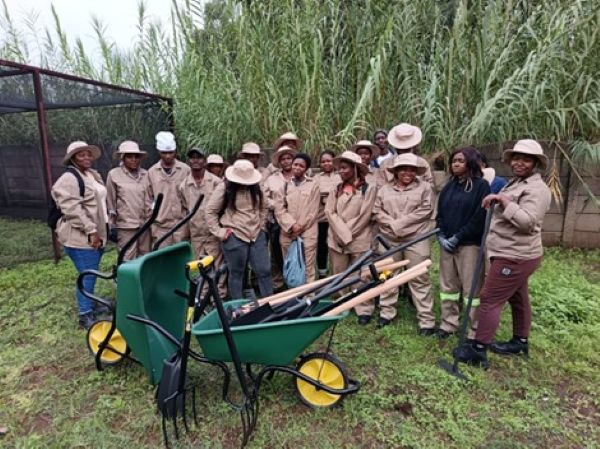By Siphesihle Qange and Yashila Govender
Komati Power Station, which had operated since 1961, played a significant role in powering South Africa through coal-generated electricity. At its height, it supplied 121 megawatts to the national grid. However, in alignment with the Integrated Resource Plan (IRP) 2019 – a strategy aimed at phasing out 10,500 megawatts of coal-based energy by 2030 – Komati was earmarked for decommissioning. Its shutdown in 2022 marked more than just the retirement of a power plant in Mpumalanga; it ushered in a new chapter of change. While 393 workers were impacted by the closure and only 162 remained on-site, as per Afsea, 2024 report, this moment also became a catalyst for reinvention, sparking efforts focused on sustainability, land regeneration, and inclusive, community-driven development. For nearby farmers and rural communities, it represents a turning point – one that promises growth, innovation, and renewed optimism for the future.
For years, the Komati area bore the brunt of industrial pollution. The region’s air, soil, and water were impacted by coal mining and emissions, making it harder for local farmers to thrive. Acidified soils, unpredictable rainfall, and water resource competition significantly curtailed productivity. The health of local communities also suffered, with respiratory illnesses and waterborne diseases becoming prevalent due to poor air quality and contaminated water sources.
The Just Energy Transition (JET) initiative, led by Eskom and supported by international partners, is at the heart of Komati’s reinvention. The site is being reimagined into a renewable energy and agrivoltaic hub, introducing technologies that allow crops like maize and sorghum to be grown beneath solar panels. This innovation not only optimises land use but also improves water retention and climate resilience.
What makes this transition especially powerful is that it is being coupled with social development – most notably through the newly launched Social Employment Fund (SEF) in the Komati region.
Implemented by Seriti Institute and funded by the Industrial Development Corporation (IDC), SEF is designed as a relief and empowerment strategy — offering work opportunities while equipping people with skills to build sustainable livelihoods. Launched in early 2025, the project is already recruiting and onboarding its first cohort of participants. Many are youth, women, and underemployed individuals from communities surrounding Komati.
Through SEF, participants will receive hands-on training in agroecological farming, climate-smart practices, land rehabilitation, and cooperative development, while receiving a monthly stipend. The program also supports enterprise incubation, helping aspiring agripreneurs turn skills into economic opportunities.
Nationally, SEF has already shown promise: it has supported over 50,000 participants, with at least 70% engaging in activities linked to food production, greening, and infrastructure maintenance. The hope is that similar outcomes will follow in Komati. By prioritising skills development as a pathway to employment, this initiative does not just address immediate economic needs but also lays the groundwork for a more resilient and self-sufficient community.
For the farming community, this couldn’t come at a better time. The NAMC 2024 report that agriculture employs about 5.5% of South Africa’s workforce, yet contributes disproportionately to food security, particularly in rural provinces. By reclaiming fallow or degraded land around Komati and redirecting it for food production and livelihoods, the local economy can benefit significantly.
What makes this story especially inspiring is the alignment between environmental restoration, clean energy generation, and social development. Komati is becoming a live demonstration of how decommissioning a coal plant can serve as a springboard, not a setback, for economic revitalisation.
“It’s not just about shutting down a power station; it’s about powering up communities with new opportunities,” says Siphesihle Qange, Programme Manager (WLG) at Seriti Institute, reflecting on the broader mission of inclusive transformation at Komati.
This transformation is a testament to the power of community-led development. It demonstrates that when people are given the resources, training, and support they need, they can turn adversity into opportunity.
“For us, SEF isn’t just a project – it’s a bridge between ecological repair and economic justice,” adds Yashila Govender, Technical Officer (Climate Change and Agriculture) at Seriti Institute, underscoring the integrated vision behind the joint advocacy.
As SEF rolls out its activities, and as more farmers gain access to inputs, infrastructure, and markets, Komati may well become a flagship for what a just and inclusive energy transition can look like – one that doesn’t leave communities behind but instead brings them along, empowering them to lead the next chapter.
In place of smokestacks, fields are emerging. And in those fields, food is growing – along with jobs, skills, and a greener, more equitable future.









